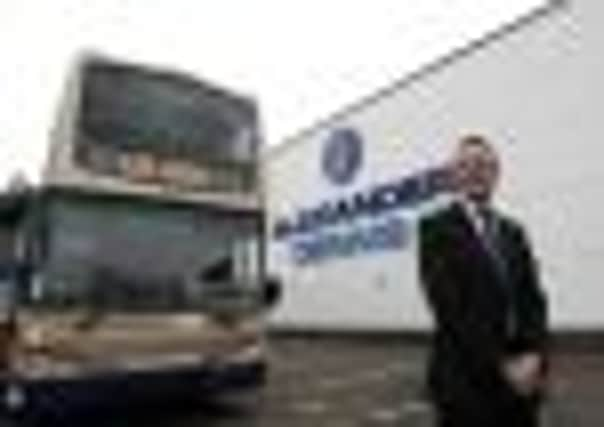Interview: Colin Robertson, chief executive of Alexander Dennis


With international sales on the rise and cash reserves building up, the boss of Alexander Dennis is now hunting acquisitions to accelerate the growth rate that has already more than doubled the Scottish bus builder’s turnover in the past four years.
Accounts due to be signed off later this week are expected to show a near-30 per cent rise in sales for 2011, with profits up nearly four-fold on the previous year to more than £15 million.
Advertisement
Hide AdAdvertisement
Hide AdPerhaps more importantly, debts – which peaked at more than £70m in 2007 – have been transformed into some £9m of cash on the balance sheet.
“Because we have reduced our debt – today we are actually sitting with a cash balance – what that is allowing us to do is to look at strategic opportunities,” chief executive Colin Robertson says.
Robertson admits feeling let down in December after the company’s first acquisitive overture was rebuffed by the major shareholder in Leeds-based Optare.
Aware that the English bus builder had been struggling financially, Robertson led a tentative approach after Aim-quoted Optare secured a £12m credit lifeline from its biggest shareholder, Indian-owned Ashok Leyland. In exchange, Ashok Leyland would see its stake in Optare trebled to 75.1 per cent.
With an eye towards taking over Optare’s shorter and narrower Solo line of buses, Alexander Dennis gate-crashed the deal before it was finalised.
However, the Scottish firm’s offer was withdrawn just a day later after Ashok Leyland said its 25 per cent stake was not for sale “to anyone at any price”.
“I didn’t shed too many tears over it – it would have been a new product area, and there are other ways to skin a cat – but at the end of the day it was a disappointment,” Robertson says.
Optare is just one of a number of targets identified by Alexander Dennis during the past six to nine months as the company has built up cash reserves.
Advertisement
Hide AdAdvertisement
Hide AdExclusive and confidential discussions are taking place with an overseas firm that Alexander Dennis would like to buy.
“It is a sound business in a very, exciting market,” says Robertson. “It will help to round out our geographic diversity.”
Having the cash to fund a buying spree marks a new phase in the 46-year-old’s tenure at Alexander Dennis, which employs nearly half of its 1,858 staff at its head office in Falkirk.
Since taking the helm in April 2007, Robertson’s focus has been upon strengthening the company’s financial performance through what has been perhaps the worst global financial crisis in history. Though Alexander Dennis was posting modest profits upon his arrival, Robertson knew improvements were necessary.
Part of his drive stems from the fact that upon joining the company, Robertson handed over a seven-figure sum to take a personal stake in the business.
He funded that investment with the proceeds from cashing in shares from his previous employer, heavy equipment manufacturer Terex, where Robertson worked for more than 12 years.
“As a working-class boy, that gave me the opportunity to crystallise that gain,” says Robertson, who left Calderhead High School at the age of 17 to take his first job as an engineering apprentice at the nearby Cummins factory in Shotts.
His minority stake puts him around the table with members of the consortium that bought Alexander Dennis from the collapsed remains of former owner Mayflower in 2004.
Advertisement
Hide AdAdvertisement
Hide AdThat group, which paid £90m to bring the company out of administration, includes: metal magnate and former Rangers football club owner Sir David Murray; Stagecoach founder Sir Brian Souter; Souter’s sister, Ann Gloag; and merchant banker Sir Angus Grossart.
“It is great to have supportive shareholders, because without them I wouldn’t have the runway to do what we are doing,” Robertson says.
Under Robertson’s leadership, the company has raised its share of the UK bus market to 50 per cent by selling to all of the UK’s top-five operators. International growth has also been a priority, with joint ventures set up in places such as California, Hong Kong and New Zealand.
Accomplishments to date have earned a number of accolades for both the company and Robertson, who is one of the key speakers at a major conference being held tomorrow in Dunblane by the Scottish Manufacturing Advisory Service.
His speech comes on the heels of picking up the top award as director of the year at last week’s annual Institute of Directors dinner, though Robertson is quick to highlight the contributions of others.
“It is great to be chief executive and sort of be the face of the business, but it really is down to having a fantastic team,” he says. “I am one of 1,800 people.”
Overseas sales now generate about 40 per cent of revenues, which last year reached £360m.
Robertson is predicting a further surge in turnover this year and as much as a 50 per cent rise in profits as international sales are driven particularly by growth in North America and Southeast Asia.
“What we are looking to do is grow the business,” says Robertson.
“We would like to have 50 per cent or less of our turnover coming from the UK, not by losing any sales, but by growing the top line.”